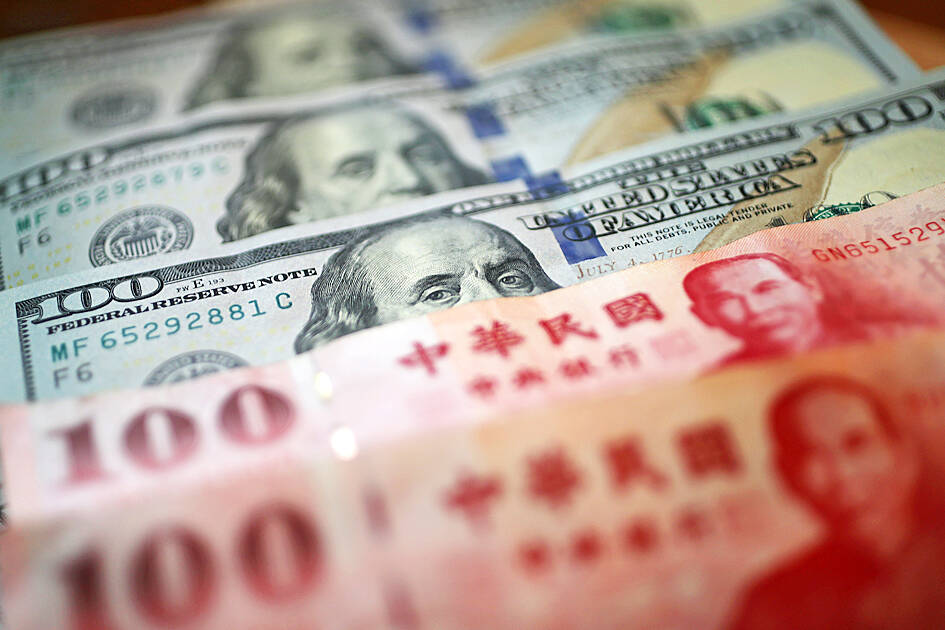Taiwan’s currency is forecast to face depreciation pressure and trade at NT$32.34 per US dollar on average this year, the Taiwan Institute of Economic Research (TIER, 台灣經濟研究院) said last week, down NT$0.94 from its previous prediction.
The New Taiwan dollar rose along with the Japanese yen and other Asian currencies on Friday after the Bank of Japan’s interest rate hike, settling at NT$32.682 against the US dollar, up NT$0.088 from the previous session. Taiwan’s financial markets are closed this week for the Lunar New Year holiday.
In a report on the outlook for Taiwan’s economic development issued on Friday, the institute said the NT dollar, like its Asian peers, would continue to face depreciation pressure against the US dollar, even though the nation’s economic fundamentals would continue to be driven by strong global demand for artificial intelligence applications and high-performance computing devices, and are sufficient to support the value of the local currency, it said.

Photo: CNA
That is because the pace of interest rate cuts by the US Federal Reserve is slower than market expectations, and uncertainty about US President Donald Trump’s trade policy has increased significantly since he took office last week, the institute said.
In comparison, the Chung-Hua Institution for Economic Research (中華經濟研究院) predicts the NT dollar to trade at NT$31.73 against the US dollar on average this year, after taking into account relative prices, interest rate differentials, economic conditions, monetary policies and regional currencies; the Taiwan Research Institute (台灣綜合研究院) expects the NT dollar to trade at NT$32.41 against the greenback on average, as it believes that a stable economic outlook will help Taiwan's central bank keep its policy rates on hold and narrow the interest rate gap between Taiwan and the US; and the Academia Sinica projects the average exchange rate of the local currency to the US dollar at NT$ 32.51.
“Looking ahead to 2025, the global economy will still face many challenges, among the most critical being the US’ economic and trade policy changes under the Trump administration, the monetary policy trajectory of major central banks in various countries, the effectiveness of China’s economic stimulus measures and the domestic investment momentum in Taiwan,” the TIER report said.
“These factors not only affect Taiwan’s export performance, but also Taiwan’s domestic demand and consumption through financial markets and import prices. They are worthy of further observation and analysis,” it said.
It is worth noting that for countries with a large trade surplus with the US and included in the US Department of the Treasury’s currency watchlist, such as Taiwan, the exchange rates for their currencies would be under heavy pressure under the Trump administration, the institute said earlier.
Ministry of Finance data showed that Taiwan’s trade surplus with the US jumped 83.53 percent year-on-year to US$64.88 billion last year, which increases the chances of the nation becoming a target of US tariffs.
Central bank Governor Yang Chin-lung (楊金龍) in November last year said that Taiwan could consider expanding purchases of energy, agricultural goods and military products from the US to reduce the trade deficit.
Taiwanese firms increasing investments in the US could be another way to achieve this goal, he added.

Real estate agent and property developer JSL Construction & Development Co (愛山林) led the average compensation rankings among companies listed on the Taiwan Stock Exchange (TWSE) last year, while contract chipmaker Taiwan Semiconductor Manufacturing Co (TSMC, 台積電) finished 14th. JSL Construction paid its employees total average compensation of NT$4.78 million (US$159,701), down 13.5 percent from a year earlier, but still ahead of the most profitable listed tech giants, including TSMC, TWSE data showed. Last year, the average compensation (which includes salary, overtime, bonuses and allowances) paid by TSMC rose 21.6 percent to reach about NT$3.33 million, lifting its ranking by 10 notches

Popular vape brands such as Geek Bar might get more expensive in the US — if you can find them at all. Shipments of vapes from China to the US ground to a near halt last month from a year ago, official data showed, hit by US President Donald Trump’s tariffs and a crackdown on unauthorized e-cigarettes in the world’s biggest market for smoking alternatives. That includes Geek Bar, a brand of flavored vapes that is not authorized to sell in the US, but which had been widely available due to porous import controls. One retailer, who asked not to be named, because

SEASONAL WEAKNESS: The combined revenue of the top 10 foundries fell 5.4%, but rush orders and China’s subsidies partially offset slowing demand Taiwan Semiconductor Manufacturing Co (TSMC, 台積電) further solidified its dominance in the global wafer foundry business in the first quarter of this year, remaining far ahead of its closest rival, Samsung Electronics Co, TrendForce Corp (集邦科技) said yesterday. TSMC posted US$25.52 billion in sales in the January-to-March period, down 5 percent from the previous quarter, but its market share rose from 67.1 percent the previous quarter to 67.6 percent, TrendForce said in a report. While smartphone-related wafer shipments declined in the first quarter due to seasonal factors, solid demand for artificial intelligence (AI) and high-performance computing (HPC) devices and urgent TV-related orders

STILL LOADED: Last year’s richest person, Quanta Computer Inc chairman Barry Lam, dropped to second place despite an 8 percent increase in his wealth to US$12.6 billion Staff writer, with CNA Daniel Tsai (蔡明忠) and Richard Tsai (蔡明興), the brothers who run Fubon Group (富邦集團), topped the Forbes list of Taiwan’s 50 richest people this year, released on Wednesday in New York. The magazine said that a stronger New Taiwan dollar pushed the combined wealth of Taiwan’s 50 richest people up 13 percent, from US$174 billion to US$197 billion, with 36 of the people on the list seeing their wealth increase. That came as Taiwan’s economy grew 4.6 percent last year, its fastest pace in three years, driven by the strong performance of the semiconductor industry, the magazine said. The Tsai